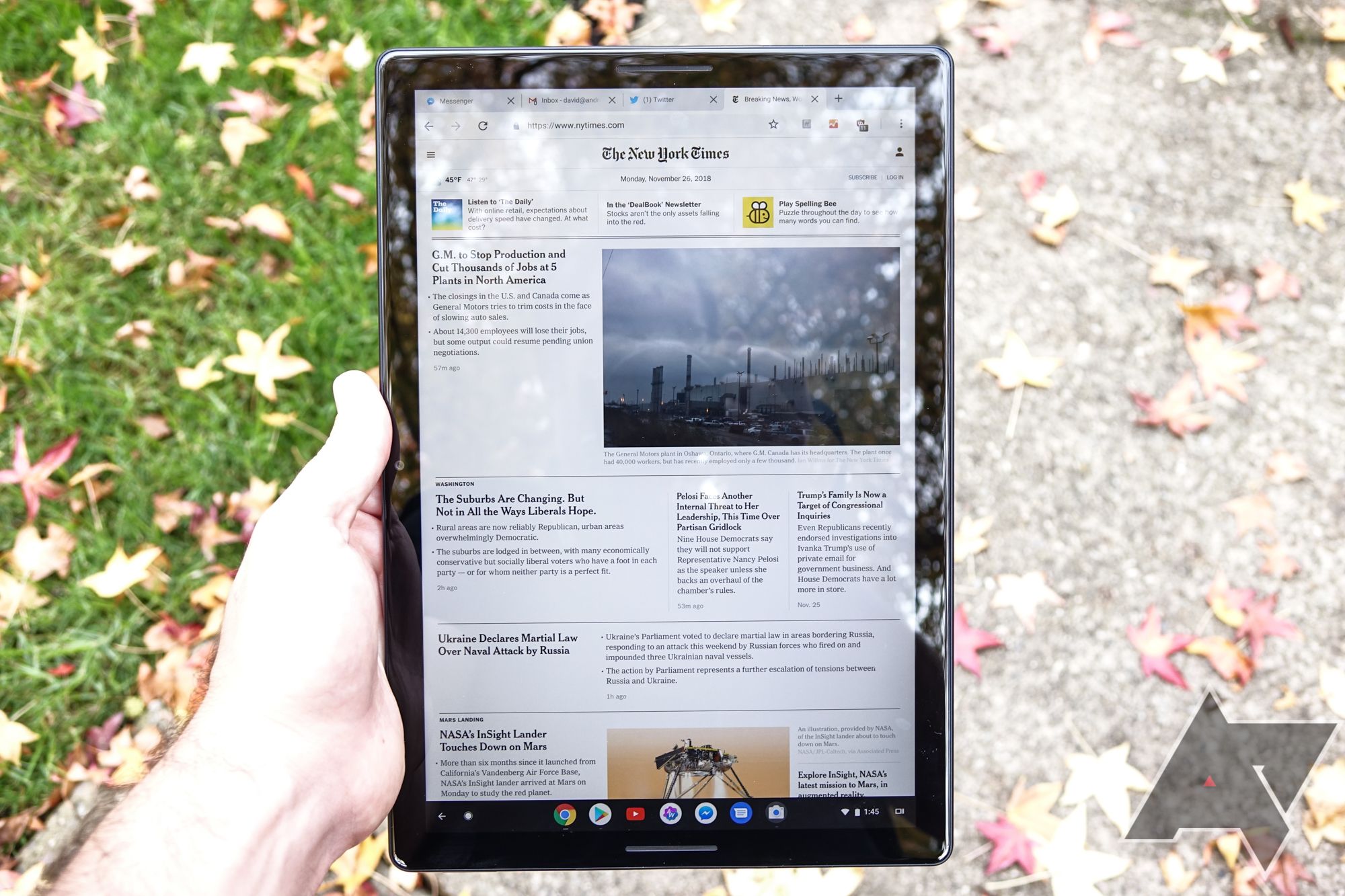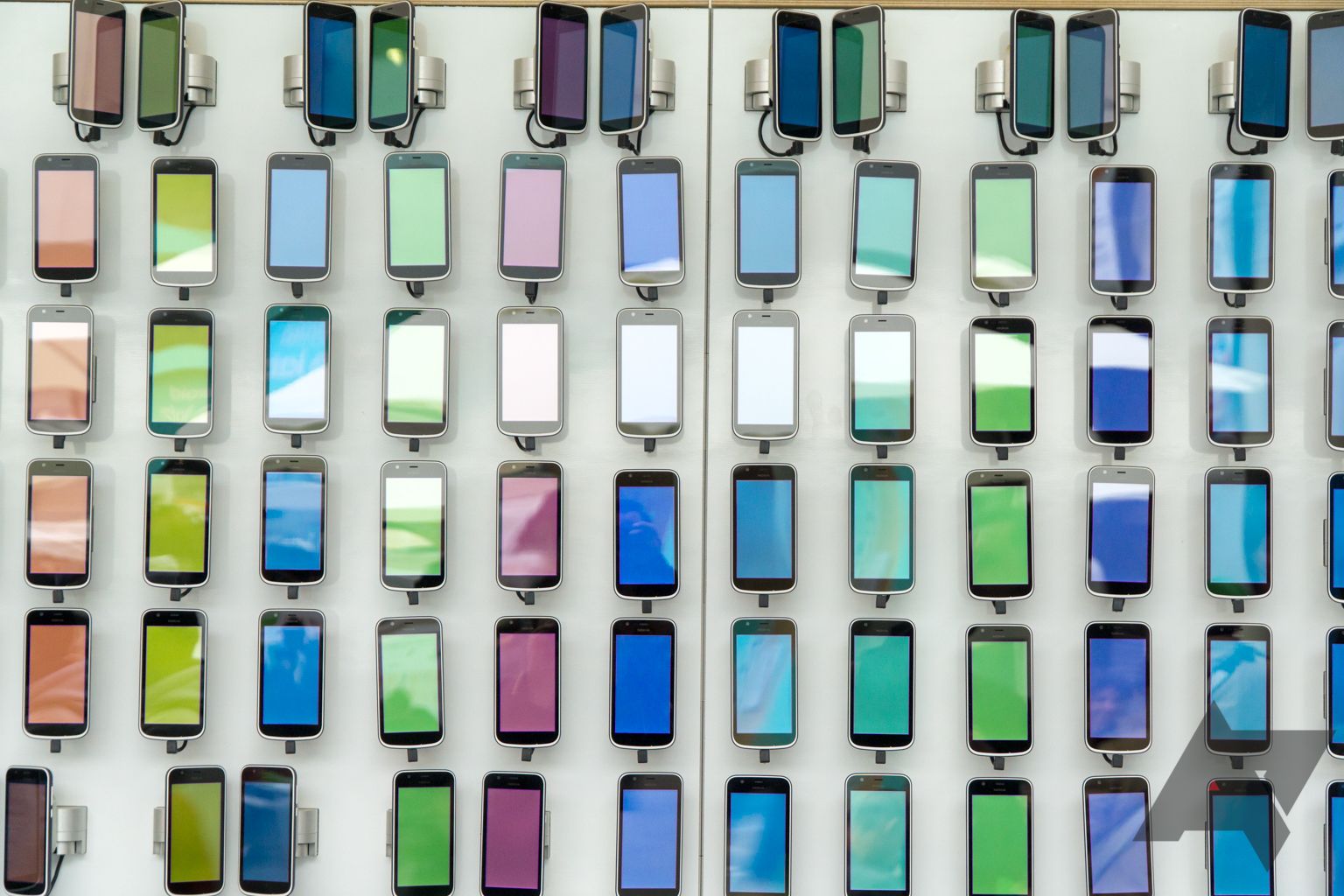
David Ruddock
Contributing since June, 2010
-
3358articles
Page 11
About David Ruddock
David is the former Editor-in-Chief of Android Police and now the EIC of Esper.io. He's been an Android user since the early days - his first smartphone was a Google Nexus One! David graduated from the University of California, Davis where he received his bachelor's degree, and also attended the Pepperdine University School of Law.
Latest Articles

HP's new Chromebook 14 officially launched this morning, making it one of two AMD Chromebook launches so far during CES. The 14, as the name suggests, is a 14" laptop with an AMD A4 or A6 processor (depending on variant and region), and will start at an extremely reasonable $269. That gets you the AMD A4 processor with a 768p non-touch panel, but I was told that the version with a 1080p touchscreen should come in closer to $300, making it an easy choice for an upgrade.

Acer announced a rather large AMD-powered Chromebook at CES this morning (as did HP), the Chromebook 315. The new laptop has a 15.6" display and is available with up to 8GB of RAM and an optional touchscreen. The specifications on the base model aren't clear, but we'd guess you're looking at 4GB of RAM and a non-touch display for the bare bones, which Acer says will start at $279 here in the US. That's a pretty incredible price for a laptop with a 15W processor, though it's not clear how the AMD A4 9120C chip stacks up against comparable Intel products. An optional A6 9220C CPU gets you a more powerful Radeon R5 with three dedicated GPU cores (the A4 gets a Radeon R4 with two cores), and presumably is offered with the 8GB RAM bump.

Google’s hardware division is a rare success story inside a remarkably successful company - and one that has taken the better part of a decade to meet that definition. Its ambitions in the physical product space have grown from a geeky internet sideshow into a full-scale retail assault, and 2018 saw that ascendance continue. For all the naysayers it’s had - and there have been many - Google continues to position its hardware portfolio exactly where it needs to be: in stores. Chromecasts and Home Minis litter hundreds of Walmarts, Targets, and Best Buys, and Pixel smartphones are in Verizon locations across the country. Based on analyst estimates, that hardware is also becoming a moneymaker - Google reportedly took in billion in profit from the division this year. If Rick Osterloh was getting a report card for his leadership from a business standpoint, he’d undoubtedly be an ‘A’ student.

While it wasn't pointed out to us until a couple of weeks ago, apparently smartphone non-maker Saygus published a blog post back in November of 2018, begging investors for cash. It's exactly the sort of desperation we'd expect of a company that announced a smartphone three years ago then never shipped it to anyone. And yet, Saygus came back again, and again, and again with excuses, telling would-be customers that their phone was only getting better, just a little delayed, and would be out shortly. It never launched.

Read update
Viewing the full web is one of the great parts of using a Chromebook, but sometimes the full web doesn't feel quite so full - especially if you're exploring it with a touchscreen. Much of the internet remains poorly-optimized for touch, and desktop websites are still, first and foremost, designed for point-and-click experiences. With the launch of the Pixel Slate, Google's senior product manager for Chrome OS, Kan Liu, confirmed to me in an interview that the company is aware that not all websites are going to be a great fit for a touchscreen. To address that, an upcoming release of Chrome OS for tablets and touch-enabled Chromebooks will add the option to render the mobile version of a webpage.

Speaking to a source familiar with the company's plans, we've learned that Google intends to launch two new Pixel smartphones on Verizon in early spring 2019 - the Pixel 3 and 3 XL "Lite." An exact announcement date and pricing are not yet known. A Pixel 3 Lite prototype was leaked on a Russian tech blog last month, fueling rampant speculation about where the phone would be sold and how it would be positioned in Google's larger smartphone lineup. Later, renders of the 3 Lite and a larger XL variant were released by OnLeaks.

Every two years, we buy a smartphone. At least, that’s what we’ve been told is reasonable to expect of the Average Person. And while reality means that this figure varies widely between any given two people, we do know that the companies that make and sell smartphones have this expectation. That, once a smartphone is two years old, most people are probably ready to get rid of it for something better. But there’s a wrinkle: everything we know tells us that’s changing.

OnePlus is something of a Cinderella story in the smartphone world. It seemed to appear out of nowhere, releasing a phone with numbers that matched the best the likes of Samsung and HTC had to offer - and did it at half the price. The OnePlus One went viral in a way few products do, and the rest is history (well, as much as four years can be “history”). OnePlus just keeps improving on that formula, most recently with the excellent OnePlus 6T, which I’ve had a chance to use for the last few weeks. And it really is a great phone - we even gave it our ‘Phone of the Year’ award. But what if I told you there was another phone that was almost physically identical to the 6T, with a crazy blue and purple color scheme, and that it’s sold in China by a company called Oppo?

Android Police often does picks for our top smartphones of any given year - and you can see those phones right here in our 2018 “Most Wanted” article. But this year, we’ve decided to single out one device for attention in particular. The smartphone we thought did most to change the game. To go above and beyond competitors and offer a unique and compelling experience to buyers. And, crucially, that we felt constituted a reasonable value in doing so (that’s not to say it needed to be inexpensive, but that its price was justifiable).

The Pixel Slate is, in a word, flawed. It’s not a very good laptop; the official keyboard case is nigh-unusable on anything but a completely flat surface, far too bulky for most airline trays, and the folding fabric kickstand can make balancing it a precarious affair. Nor is it an especially good tablet, with Chrome OS’s full-touch experience making it feel more like an unfinished software science experiment than a real first generation product.

The Snapdragon 855 was fully revealed yesterday, but rumors that Qualcomm was holding back something even more powerful were just confirmed during a keynote presentation at the company’s tech summit event here in Hawaii. Snapdragon 8cx is its name, and it’s not the superpowered heart of your next smartphone - but it could be in your next laptop.

Qualcomm described its new flagship Snapdragon 855 processor in detail today at the company’s annual tech summit event in Hawaii, and we’ve got the goods for you here. Below, you’ll find a table of basic processor specifications.

Qualcomm announced the Snapdragon 855 processor in Maui this morning as part of its annual tech summit event. No details about the chip have yet been revealed (other than it's faster and better than the last chip, which duh), but we expect that will change tomorrow, given the day’s keynote will have the 855 as its focus. What we do know is that the 855 will probably power the bulk of next year’s high-end smartphones (because what else would?).

5G is coming - at least to America. For all the very-understandable skepticism, it’s clear now that the US’s big four wireless carriers are deeply committed to launching 5G, and they’re in a network arms race to be the first to deliver on the promise of the next generation cellular technology. And it could make buying your next phone a lot more annoying.

In the lead-up to our Pixel Slate not-review, I had a chance to interview the senior product manager for Chrome OS at Google, Kan Liu. We talked about the larger tablet experience on Chrome OS and where the operating system was headed, when at one point I brought up the question of virtual desktops (also known as workspaces). Liu was aware of Chrome's shortcomings in that respect, and while I acknowledged that the expose feature allows users to keep multiple windows available to them with their preferred tabs open, it's not a direct replacement for virtual desktops, something other operating systems like Mac OS and Windows have long supported.

The Pixel Slate is one of the most confounding products I’ve used in my time at Android Police. On the one hand, it feels mature: Chrome OS truly is a real operating system in 2018, and using the Slate as I would any other Chromebook is a pretty great experience. On the other, it’s also frustratingly unfinished: Chrome OS isn’t much of a tablet operating system in 2018, and that’s not something that’s going to change overnight. That can make the whole “slate” part of the Pixel Slate seem like an afterthought. (Note: This isn't our review, which will go live later in the week, because I want some more time with this thing.)

Pulled from the Play Store two months ago, Sam Ruston's much-loved indie weather app Weather Timeline has reappeared, sort of - with a different developer listed as the publisher (the listing still isn't visible if you never installed the app, so you can't get it if you never had it).

When it comes to home security, peace of mind and convenience are what matter to me, making a smart lock pretty damn appealing. We know that homes generally aren't targeted by burglars for a lack of obstacles, but for an abundance of opportunity (like an unlocked door!), and a smart door lock leaves one less thing to chance when you're away on vacation or at the office. All the locks in the world probably aren't going to stop someone truly determined to break into your home - so unless you're barring your windows and using solid exterior doors (and most US homes aren't), I don't think the physical security argument has many legs to stand on. A visible security camera and some background music will do far more to deter a break-in than a Medeco deadbolt.

Carriers aren't looking to cut you a deal. Installment plans are just contracts by another name. Last year's phone is not "just as good" as this year's.

Black Friday can be an absolutely overwhelming time to shop. The sheer volume of deals seems to grow ever more gargantuan each year, as do the number of days before the day that shall not be said again where good deals start to pop up. While I can't promise you that the eight we're highlighting here are the very best deals of all time, they're ones we feel have provided the strongest balance of value and desirability (as well as relevance to AP readers) so far. So, here they are in no particular order.

